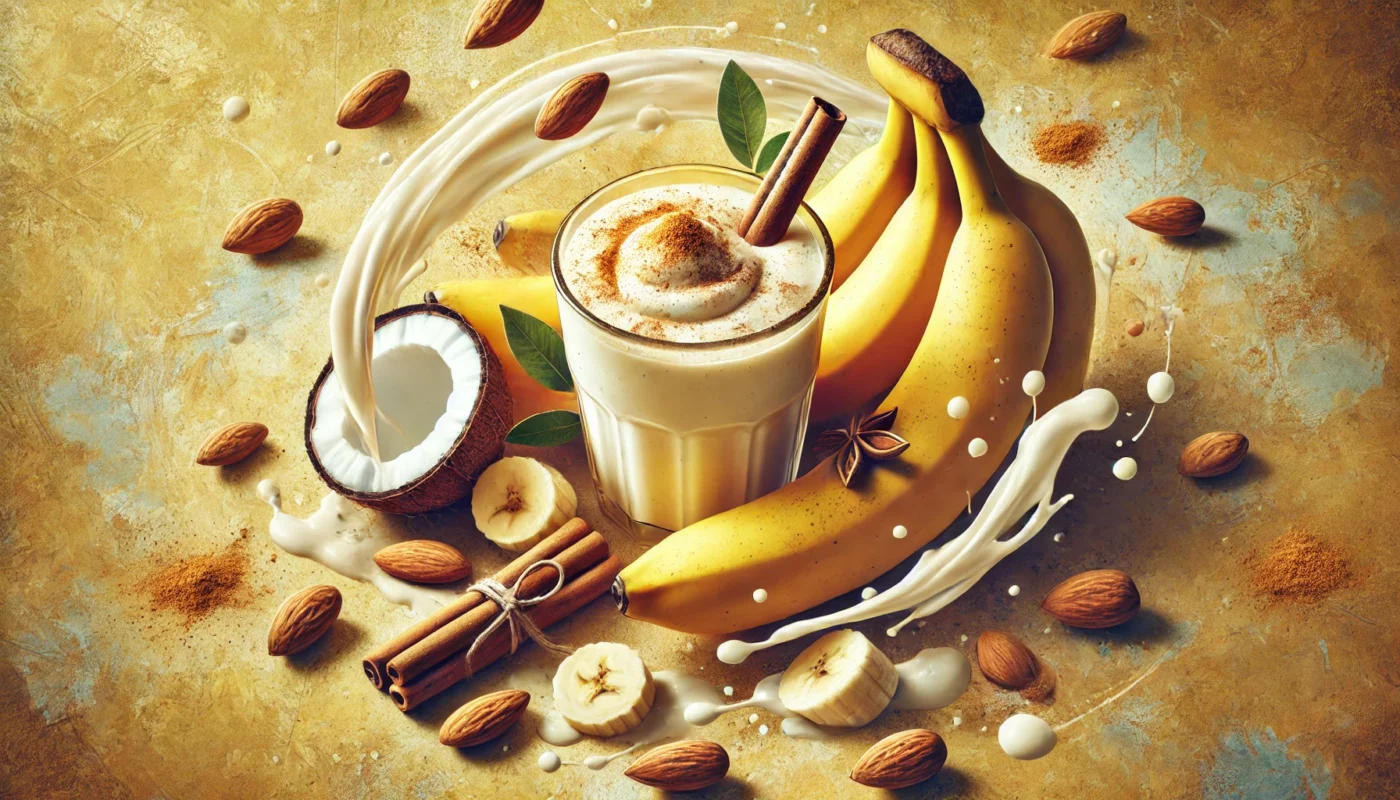In the quest for optimal health and wellness, individuals are increasingly exploring holistic and alternative approaches to manage inflammation—a common underlying factor in numerous chronic health conditions. This exploration often leads to a closer look at dietary choices. One food that repeatedly comes into question in this context is the humble banana. Are bananas truly anti-inflammatory, or do they contribute to inflammation? Let’s delve into the science and explore the potential benefits of incorporating bananas into your diet.
You may also like: 20 Powerful Anti-Inflammatory Foods
The Nutritional Powerhouse: Understanding Bananas
Before addressing the anti-inflammatory properties of bananas, it’s essential to delve deeply into their nutritional composition. Bananas are not only a convenient snack but also a rich source of essential nutrients, including vitamin C, vitamin B6, and dietary fiber. They also contain a significant amount of potassium, a mineral that plays a vital role in regulating blood pressure and maintaining electrolyte balance.
The Vitamins in Bananas: A Closer Look
- Vitamin C: An Antioxidant AllyVitamin C is renowned for its powerful antioxidant properties. It combats oxidative stress by neutralizing free radicals—unstable molecules that can cause cellular damage. In addition to supporting immune function, vitamin C aids in collagen production, wound healing, and enhances the absorption of iron from plant-based foods.
- Vitamin B6: Brain and Metabolic HealthVitamin B6 is crucial for various bodily functions, including brain health. It aids in the production of neurotransmitters, chemicals that transmit signals in the brain, affecting mood regulation and cognitive function. Furthermore, vitamin B6 is involved in metabolic processes, including the conversion of food into energy and the synthesis of hemoglobin.
Dietary Fiber: The Digestive Champion
Bananas provide a substantial amount of dietary fiber, essential for maintaining digestive health. Soluble fiber in bananas helps regulate bowel movements and may lower cholesterol levels. Fiber also contributes to a feeling of fullness, which can aid in weight management. A diet rich in fiber supports a healthy gut microbiome, which is crucial for overall health and well-being.
Potassium: Beyond Blood Pressure
As a vital electrolyte, potassium is essential for numerous physiological processes. It helps maintain fluid balance, supports muscle contractions, and is crucial for nerve function. Potassium’s role in reducing blood pressure is well-documented; it helps counteract the effects of sodium and reduces tension in blood vessel walls, promoting cardiovascular health.
The Science Behind Inflammation
Inflammation is a natural response of the immune system to injury or infection. However, chronic inflammation can lead to various health issues, including heart disease, diabetes, and arthritis. To mitigate these risks, it’s essential to incorporate anti-inflammatory foods into your diet.
Understanding the Inflammatory Process
- Acute vs. Chronic InflammationAcute inflammation is a short-term response to injury or infection, characterized by redness, swelling, and pain. It is a protective mechanism that helps the body heal. In contrast, chronic inflammation is a persistent, low-level inflammation that can last for months or years, often going unnoticed. It is associated with a range of chronic diseases and can be detrimental to health.
- The Role of Diet in InflammationDiet plays a significant role in modulating inflammation. Certain foods, like processed and high-sugar items, can exacerbate inflammation, while others, such as fruits, vegetables, and whole grains, have anti-inflammatory properties. A balanced diet rich in antioxidants, vitamins, and minerals can help reduce inflammation and promote overall health.
- The Impact of Lifestyle FactorsBeyond diet, lifestyle factors such as stress, sleep, and physical activity also influence inflammation. Chronic stress can lead to prolonged inflammation, while regular physical activity and sufficient sleep are known to reduce inflammatory markers. An integrated approach that includes dietary and lifestyle modifications is crucial for managing inflammation effectively.

Are Bananas Anti-Inflammatory?
While bananas are not explicitly categorized as an anti-inflammatory food, they contain several compounds that may help reduce inflammation.
- Dopamine: Beyond Mood RegulationBananas contain dopamine, a neurotransmitter known for its role in mood regulation. Interestingly, dopamine in bananas also exhibits antioxidant activity, which can neutralize free radicals and potentially reduce inflammation. This dual function highlights the complex interplay between diet and neurochemistry.
- Phenolics: Nature’s Anti-Inflammatory AgentsPhenolic compounds are plant-based chemicals with potent anti-inflammatory properties. Found in bananas, these compounds have been shown to inhibit inflammatory pathways at the cellular level. They may also enhance the body’s antioxidant defenses, providing a protective effect against chronic inflammation.
- Resistant Starch: A Prebiotic PowerhouseGreen, unripe bananas are high in resistant starch, a type of carbohydrate that resists digestion in the small intestine. Instead, it acts as a prebiotic, feeding beneficial gut bacteria. A healthy gut microbiome is crucial for regulating inflammation, and resistant starch has been linked to improved gut health and reduced inflammatory markers.
Bananas and Gut Health
The health of your gut has a profound impact on inflammation. An imbalance in gut bacteria can lead to increased inflammation and a higher risk of chronic diseases. Bananas, particularly when unripe, are an excellent source of resistant starch, which serves as a prebiotic.
The Role of Resistant Starch
Resistant starch in bananas acts as food for beneficial gut bacteria. As these bacteria ferment resistant starch, they produce short-chain fatty acids like butyrate, which have been shown to reduce inflammation and improve gut health.
The Microbiome Connection
- Gut Health and ImmunityA balanced gut microbiome is essential for a well-functioning immune system. The gut is home to a large proportion of immune cells, and a healthy microbiome helps modulate immune responses, reducing the risk of chronic inflammation and autoimmune diseases.
- Butyrate: The Anti-Inflammatory Fatty AcidButyrate, a short-chain fatty acid produced during the fermentation of resistant starch, plays a critical role in maintaining gut health. It serves as an energy source for colon cells and has been shown to strengthen the gut barrier, preventing the leakage of inflammatory substances into the bloodstream.
- The Prebiotic AdvantagePrebiotics like resistant starch support the growth of beneficial bacteria, such as Bifidobacteria and Lactobacilli. These bacteria are known for their anti-inflammatory properties and contribute to a balanced gut environment. Incorporating prebiotics into the diet is a proactive step toward improving gut health and reducing inflammation.
Practical Tips for Incorporating Bananas into Your Diet
Choose the Right Ripeness
The ripeness of bananas can affect their nutritional profile. While ripe bananas are sweeter and easier to digest, unripe bananas contain more resistant starch, which can be beneficial for gut health and inflammation.
Pair Bananas with Other Anti-Inflammatory Foods
To maximize the anti-inflammatory benefits, consider pairing bananas with other foods known for their anti-inflammatory properties, such as:
- Nuts and Seeds: Omega-3 Rich AlliesAlmonds and walnuts are excellent sources of omega-3 fatty acids, which have anti-inflammatory effects. Pairing bananas with a handful of nuts or seeds can create a nutrient-dense snack that supports heart health and reduces inflammation.
- Berries: Antioxidant PowerhousesRich in antioxidants, berries like blueberries and strawberries complement the health benefits of bananas. Combining these fruits in a smoothie or fruit salad can enhance the intake of vitamins, minerals, and phytochemicals, promoting overall wellness.
- Yogurt: A Probiotic BoostFermented foods like yogurt enhance gut health by providing probiotics—beneficial bacteria that support digestion and immune function. Pairing bananas with yogurt not only adds flavor and texture but also works synergistically to promote a healthy gut microbiome.

Creative Ways to Enjoy Bananas
- Banana Smoothie BowlsBlend bananas with spinach, almond milk, and a scoop of protein powder for a nutrient-packed smoothie bowl. Top with chia seeds, sliced almonds, and fresh berries for added texture and nutritional benefits.
- Banana PancakesMash ripe bananas and mix with eggs and oats to create a simple batter for pancakes. Cook in a non-stick skillet and serve with a drizzle of honey or a sprinkle of cinnamon for a delicious breakfast option.
- Frozen Banana TreatsSlice bananas and freeze them for a refreshing and healthy dessert. Dip in dark chocolate and roll in crushed nuts for an indulgent yet nutritious treat.
Addressing Common Concerns
Do Bananas Cause Inflammation?
There is no substantial scientific evidence to suggest that bananas cause inflammation. However, individual responses can vary, and some people may experience digestive discomfort due to the sugar content in ripe bananas.
Bananas and Allergies
While rare, some individuals may be allergic to bananas. Symptoms can include itching, swelling, or respiratory issues. If you suspect an allergy, consult a healthcare professional.
Balancing Banana Consumption
- Moderation is KeyAs with any food, moderation is crucial when incorporating bananas into your diet. While they offer numerous health benefits, consuming them in excessive amounts can contribute to calorie intake and may not be suitable for individuals with specific dietary restrictions.
- Personalized Dietary ChoicesIt’s essential to tailor dietary choices to individual needs and health goals. Consulting with a healthcare professional or a registered dietitian can provide personalized guidance on how best to incorporate bananas and other anti-inflammatory foods into a balanced diet.
- Listening to Your BodyPaying attention to how your body responds to different foods is critical for maintaining health. If you notice any adverse reactions after consuming bananas, consider adjusting the portion size or pairing them with other foods to minimize potential discomfort.

Conclusion
Bananas, with their rich nutritional profile and potential anti-inflammatory properties, can be a valuable addition to a balanced diet. While they may not be a panacea for inflammation, they offer a range of health benefits that support overall well-being.
Incorporating bananas, particularly in combination with other anti-inflammatory foods, can be a delicious and practical strategy for those seeking to reduce inflammation and enhance health. As always, it’s essential to listen to your body and consult with healthcare professionals to tailor dietary choices to your individual needs.
By understanding the science behind bananas and inflammation, you are better equipped to make informed decisions about your diet and health practices.
Remember, a holistic approach to health encompasses a variety of foods, lifestyle choices, and mindful practices. Embrace the journey to optimal wellness with curiosity and an open mind. Adopting a proactive and informed approach to your health empowers you to make choices that align with your personal goals and overall wellness vision.
Further Reading:
Are Bananas Bad for Arthritis?
Green Bananas: Anti-Inflammatory, Good For The Gut & Cancer Fighting
anti-inflammatory, bananas, nutrition, health benefits, diet, wellness, probiotics, antioxidants, smoothie recipes, healthy snacks, dietary choices, inflammation, gut health, allergies, moderation, personalized nutrition
Important Note: The information contained in this article is for general informational purposes only, and should not be construed as health or medical advice, nor is it intended to diagnose, prevent, treat, or cure any disease or health condition. Before embarking on any diet, fitness regimen, or program of nutritional supplementation, it is advisable to consult your healthcare professional in order to determine its safety and probable efficacy in terms of your individual state of health.
Regarding Nutritional Supplements Or Other Non-Prescription Health Products: If any nutritional supplements or other non-prescription health products are mentioned in the foregoing article, any claims or statements made about them have not been evaluated by the U.S. Food and Drug Administration, and such nutritional supplements or other health products are not intended to diagnose, treat, cure, or prevent any disease

